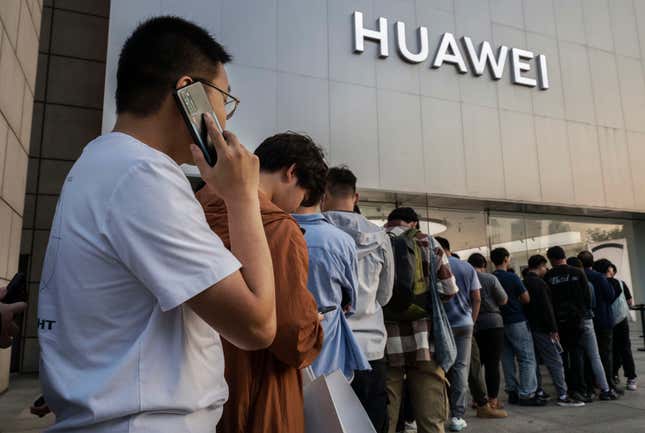
Chinese smartphone-maker Huawei reported a rise in profit for the fourth consecutive quarter, outpacing its rival Apple, and showing its resilience against U.S. sanctions.
The company reported a net profit of 19.6 billion yuan, or $2.7 million, in the first quarter — up 564% from the previous year. It also reported a 37% rise in sales to 178.8 billion yuan, or $24.7 billion.
Meanwhile, Apple’s iPhone sales in China fell 19% over the same period — its worst performance in the country since the start of the COVID-19 pandemic in 2020. Apple’s share of China’s smartphone market also fell year-over-year in the first quarter of 2024 from 19.7% to 15.7%.
Last August, Huawei released its Mate 60 Pro smartphone series. The phone is powered by the Kirin 9000s chip, which uses an advanced 7-nanometer processor made by top Chinese chipmaker Semiconductor Manufacturing International Corp. (SMIC). Both the smartphone and chip were considered a feat for Huawei. Although it’s been on the U.S. trade blacklist since 2019, Huawei saw a resurgence in China after releasing the Mate 60 Pro, with smartphone sales rising almost 70% year-over-year in the first quarter of 2024.
Huawei released its newest smartphone, the Pura 70, earlier this month. The model is powered by the Kirin 9010 processor — a newer version of the 7-nanometer processor in the Mate 60 Pro.
Sanction success?
Despite Huawei’s successes, United States officials said earlier this month its efforts to curb advanced chipmaking in China are working. Leaders added that the Kirin 9000s chip is not as advanced as the chips currently being manufactured in the U.S.
“[E]xport controls are working because that chip is not nearly as good... it’s years behind what we have in the United States,” U.S. secretary of commerce Gina Raimondo said in a recent interview on CBS’s 60 Minutes. “We have the most sophisticated semiconductors in the world. China doesn’t.”
In March, Bloomberg reported the chip in the successful Mate 60 Pro was made using technology from United States-based firms Applied Materials Inc. and Lam Research Corp. SMIC reportedly had possession of the technology before U.S. companies were barred from supplying Chinese companies with advanced chips and chipmaking equipment in October 2022.
Despite being on the U.S. sanctions list, Huawei can still receive advanced chipmaking tools from American companies who have a special license to sell to blacklisted firms.